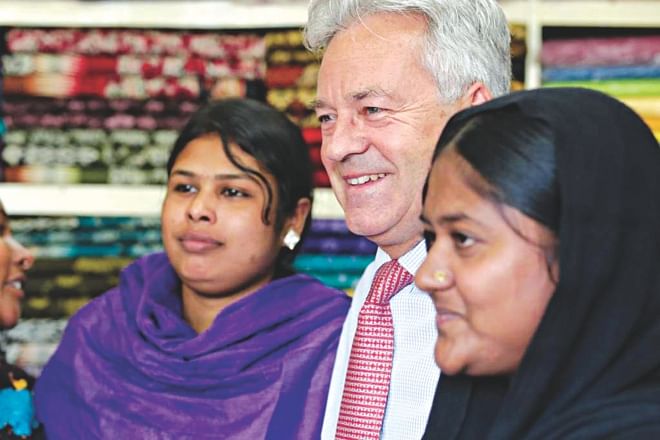Garment success will erode without better safety records
Garment success will erode without better safety records
British minister Alan Duncan urges Bangladesh to take factory standards to next level

Bangladesh will go a long way if it improves standards in the apparel industry. However, if it stumbles, the industry will shrink and its contacts will shift to other countries such as Nepal, Myanmar, China and India.
These are the views of the UK government on the Bangladesh garment industry, which is under pressure from the government and buyers in the West to improve working conditions in the factories.
Alan Duncan, UK minister of state for international development, shared these views in an interview with The Daily Star at the British High Commission last week during a three-day visit to Bangladesh.
“The Rana Plaza collapse was a wakeup call. Bangladesh has to be recognised as a high-standard garment manufacturing country and if that happens, the industry will never go backwards.”
The minister visited Dhaka to check progress in health and safety standards in the garment industry and to see how important the sector is for the economic and social development of workers in Bangladesh, including the number of women it employs.
Presently, UK provides around $300 million a year as aid to Bangladesh. It is also an important trade partner for the country.
Bangladesh exported products and services worth nearly $3 billion to the UK in 2013, up 6 percent from the previous year. Meanwhile, UK's exports to Bangladesh were worth $234 million, witnessing a whopping 36 percent year-on-year growth.
Duncan, an Oxford and Harvard graduate who is a conservative MP since 1992, also talked about politics, violence, trade and other bilateral issues between the two countries.
As the focus of his visit was the garments industry, he mostly discussed working conditions in the units, and workers' health and safety issues and standards.
“The industry has grown big from nowhere 25 years ago. Businessmen began work from single rooms, then got big contracts and expanded their factories in unsuitable buildings,” Duncan said.
These factories also take sub-contracts illegally, which is totally unacceptable, he added.
On the investments needed to make the factories compliant, Duncan believes the exporters' claim of having insufficient funds to improve the working conditions is untrue.
At the end, business matters and a good brand or company must maintain standards, he added.
“Good conditions, good health, proper safety and therefore, good business.”
On the progress in safety standards improvements, especially after the Rana Plaza collapse on April 24 last year, the minister said things are improving; but Bangladesh still needs to have clean regulations in setting up and monitoring factories.
He hopes global clothing brands will come forward to help Bangladesh improve the working condition in the units.
The UK is providing funds through International Labour Organisation to improve the working conditions in the RMG units in Bangladesh, Duncan added.
During his visit, he also announced to start three new projects, all related to improving the working conditions in the units.
However, Bangladesh has to come out of violent and unstable politics to exploit the benefits the country has, he said.
“The bilateral relationship between the two countries is enormous. But we would feel better if we see political stability and no violence.”
After the elections, there is now an opportunity for Bangladesh to escape the nastiness of politics, he said “Ultimately, political stability will ensure economic stability and growth in your country.”